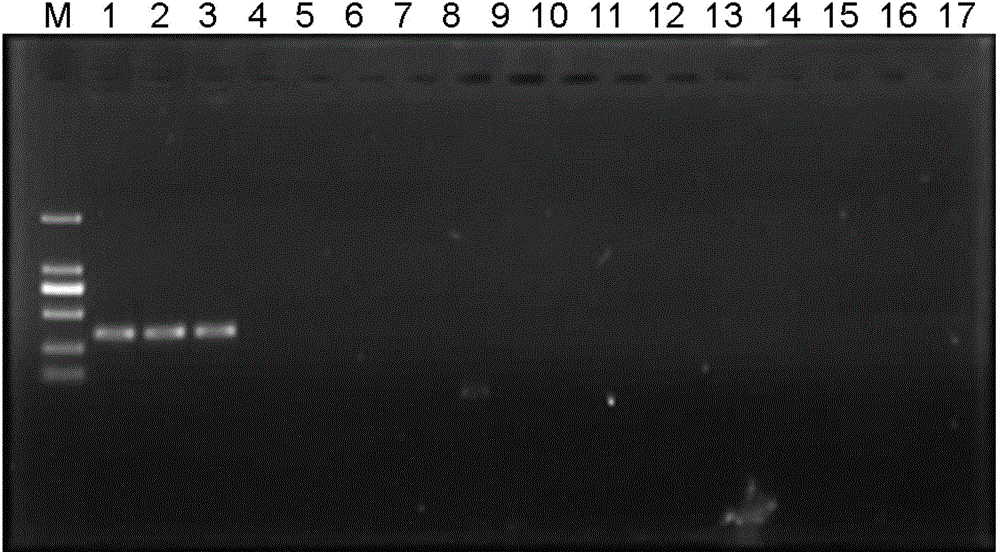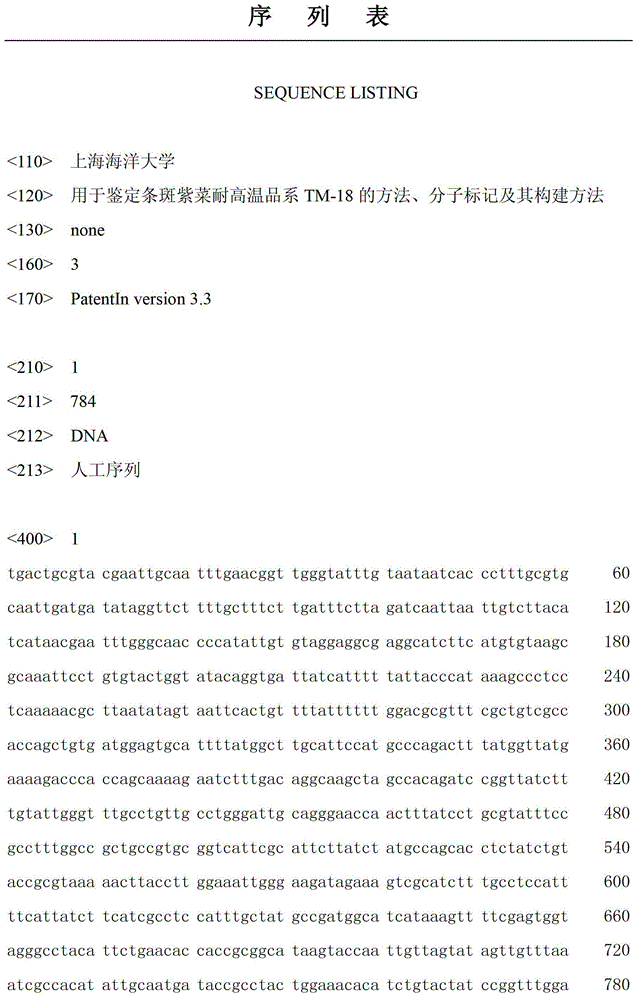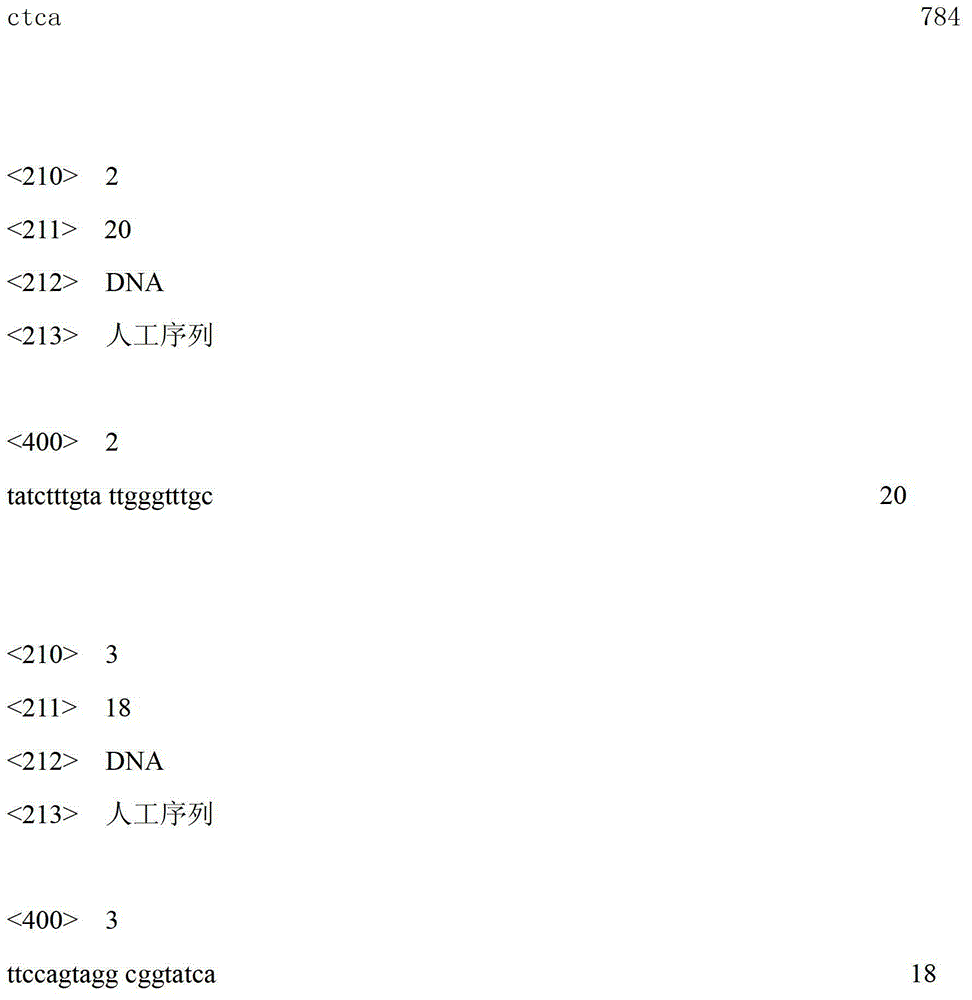Method for identifying porphyra yezoensis high-temperature-resistant strain TM-18, molecular marker and construction method for same
A technology of Porphyra striae and molecular marker, which can be applied to biochemical equipment and methods, microbial determination/inspection, DNA/RNA fragments, etc., and can solve problems such as difficulty in distinguishing heat-resistant strains from other strains, limiting the promotion and application of improved varieties, etc. , to achieve the effect of simple and intuitive judgment criteria, stable test results and high polymorphism
- Summary
- Abstract
- Description
- Claims
- Application Information
AI Technical Summary
Problems solved by technology
Method used
Image
Examples
Embodiment 1
[0043] The method for constructing a molecular marker for identifying the high temperature resistant strain TM-18 of Porphyra variegata comprises the following steps:
[0044] (1) Extraction of total DNA: Collect fresh thallus of the high temperature-resistant strain TM-18 of P.
[0045] (2) SRAP marker analysis: use the SRAP primer set to analyze the DNA obtained in step (1). For primer sequences, see: "New molecular markers—SRAP and TRAP and their applications" (Liu Liwang, Gong Yiqin, Huang Hao, Zhu Xianwen, "Heritage" 26 (5): 777-781, 2004)
[0046]The SRAP-PCR reaction system is: 10×PCR buffer2.5μL, 20ng template DNA, forward and reverse primers 20ng each, the reaction system contains 2.0mmol / L MgCl2 (final concentration), 0.2mmol / L dNTP (final concentration) and 1U Taq DNA polymerase, plus sterile ddH 2 0 to 25 μL;
[0047] The reaction program was: pre-denaturation at 94°C for 5 min; denaturation at 94°C for 1 min, annealing at 35°C for 1 min, extension at 72°C for 1...
Embodiment 2
[0072] The heat-resistant strain TM-18 and the non-heat-resistant strain of Porphyra zebra were identified respectively (samples 1-3 were the high-temperature-resistant strain TM-18 of P.
[0073] (1) Extraction of total DNA: the same method as in step (1) of Example 1;
[0074] (2) SCAR marker verification: use the primers designed in step (5) of Example 1 to perform PCR amplification on the obtained total DNA;
[0075] The reaction system is: 10×PCR buffer1.5μL, 20ng template DNA, forward and reverse primers 20ng each, the reaction system contains 2.0mmol / L MgCl 2 (final concentration), 0.2mmol / L dNTP (final concentration) and 1U Taq DNA polymerase, plus sterilized ddH 2 0 to 15 μL;
[0076] The reaction program was: pre-denaturation at 94°C for 5 min; denaturation at 94°C for 30 s, annealing at 52°C for 45 s, extension at 72°C for 45 s, repeating 35 cycles; extension at 72°C for 7 min.
PUM
 Login to View More
Login to View More Abstract
Description
Claims
Application Information
 Login to View More
Login to View More - R&D
- Intellectual Property
- Life Sciences
- Materials
- Tech Scout
- Unparalleled Data Quality
- Higher Quality Content
- 60% Fewer Hallucinations
Browse by: Latest US Patents, China's latest patents, Technical Efficacy Thesaurus, Application Domain, Technology Topic, Popular Technical Reports.
© 2025 PatSnap. All rights reserved.Legal|Privacy policy|Modern Slavery Act Transparency Statement|Sitemap|About US| Contact US: help@patsnap.com



